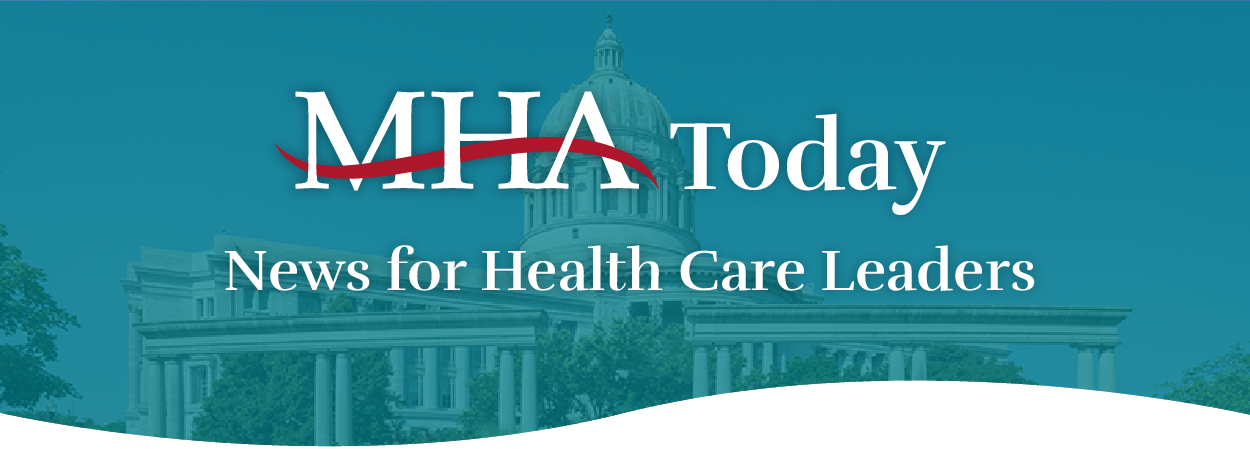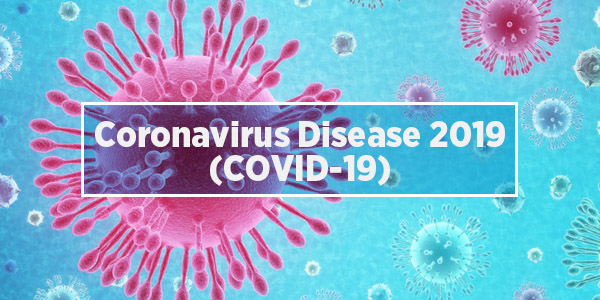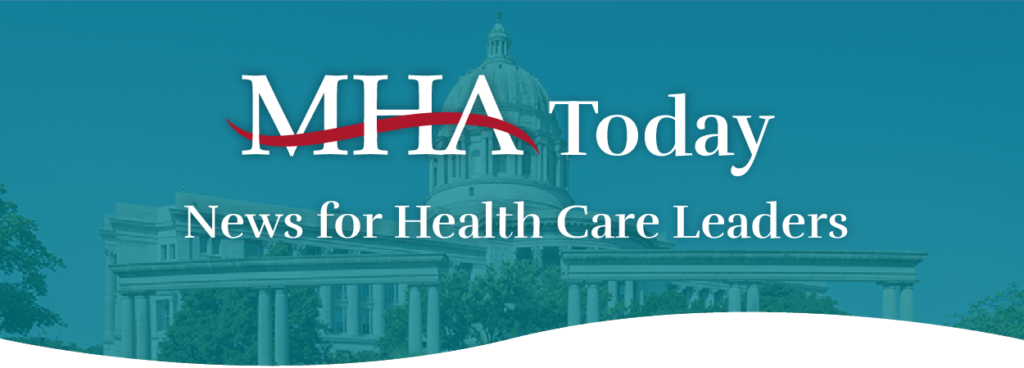Actions
Type
 |
|
MHA Today is provided as a service to members of the Missouri Hospital Association. Additional information is available online at MHAnet. Editor’s Note: “MHA Today” will not be published Monday, Sept. 7, in observance of Labor Day. Publication will resume Wednesday, Sept. 9.
|
 |
|
COVID-19 Updates |

For the latest updates and most current information on coronavirus disease 2019, visit MHA’s website. |
|
Insights |
|
Last week, the Centers for Medicare & Medicaid Services sent a strong message about their expectation for COVID-19 data reporting. In issuing an interim final rule, they linked COVID-19 data submission to program Conditions of Participation. According to the rule — at least the letter of the rule — nonreporting hospitals could lose their ability to be reimbursed for Medicare or Medicaid services. MHA objected to the sudden and harsh change, made without any meaningful opportunity to comment. Early this week, The Wall Street Journal reported that CMS was considering publicly listing hospitals not submitting required COVID-19 data. Without question, COVID-19 data is essential. Decision-makers count on testing and health care resource data to understand what options are available to protect individuals and communities from the disease. The work we have done collectively as a community of hospitals — and with partners at the state level — has been fundamental to our understanding of a complex crisis as it has unfolded. And, it must continue. Wednesday, MHA released a more robust statewide dashboard. As the disease has progressed through the state, we’ve continued to develop indicators that can inform good decision-making. And, the platform continues to be upgraded to reflect the changing environment, including entry into influenza season, efforts to return in-person attendance at schools, and other factors that are influenced by the virus or in-person activity. All of that being said, it is a bit rich for CMS and the U.S. Department of Health & Human Services to dangle such punitive measures over hospitals’ heads. Less than two months ago, HHS upended the reporting system Missouri hospitals were using to report data to the federal government by mandating TeleTracking over the National Healthcare Safety Network. Their sudden shift in platforms and addition of metrics — some of which were poorly defined — took weeks to fully pivot toward, leaving the state essentially in the dark during the transition. I recall being at CMS when an early quality reporting system was adopted. The onboarding process alone had a longer time horizon than the nine months the COVID-19 virus has been in the nation. Eventually, as with all similar systems, a penalty for nonparticipation was adopted. That build time helped create value and critical mass, while encouraging participation through increased public transparency. Today, every hospital in Missouri is participating in data submission to TeleTracking. There only are a handful of hospitals that have missed data elements or have lagged behind the system’s daily data upload timeline. MHA works with these hospitals to ensure they are aware of the problem and aren’t left behind. HHS’ rush to implement TeleTracking created barriers — including an inability to submit missed data or revise previous days’ submissions. HHS has listened, and most of the original kinks have been ironed out. The system now allows for revisions, and this flexibility is helping us build out a complete picture of the hospital resources in the state. Change orders are costly. When they occur, the responsible party shouldn’t expect to hold the other party accountable. In April, we had an understanding with the federal government that the reporting platform would be NHSN. We successfully worked as a state to build full participation. In July, they submitted a change order for TeleTracking. Despite the disruption, Missouri hospitals made it work — we’re back online and have built a more robust dashboard. I’m not sure why there is no carrot and only stick. However, as long as we continue on the path we’re on, Missouri’s data project will be world class. P.S. — Tom Bell, President and CEO of the Kansas Hospital Association, retired Aug. 31. Tom was a great leader, passionate advocate and very good friend. His contribution was large during his tenure at KHA, and the state is better for his work to improve the state’s hospitals and the health of all Kansans. We wish him well in his future endeavors. Let me know what you’re thinking.
Herb B. Kuhn
MHA And MPCA Urge Action On 340B Concerns |
|
Advocate |
MHA And MPCA Urge Action On 340B ConcernsStaff Contact: Daniel Landon The Missouri Hospital Association and the Missouri Primary Care Association jointly wrote the U.S. Health Resources and Services Administration regarding emerging challenges in the 340B drug discount program. The letter urges HRSA to take action to block efforts by pharmaceutical manufacturers to limit the scope of 340B coverage. HHS Releases Rural Action PlanStaff Contact: Daniel Landon The U.S. Department of Health and Human Services released a Rural Action Plan. Developed by the HHS Rural Task Force, it “provides a roadmap for HHS to strengthen departmental coordination” to better serve rural residents. The plan has a “four-point strategy to transform rural health and human services,” involving: building a sustainable model for rural communities, leveraging technology and innovation, preventing disease and mortality, and increasing rural access to care.
|
|
Regulatory News |
DHSS Issues Electronic Monitoring Guidance For Nursing FacilitiesStaff Contact: Sarah Willson The Authorized Electronic Monitoring in Long-Term Care Facilities Act became law on Aug. 28. Because of concern for COVID-19 spread, current state and federal guidelines are in place that restrict visitation of all visitors and non-essential health care personnel to residents of long-term care facilities. The Missouri Department of Health and Senior Services has issued guidance for LTCFs regarding electronic monitoring device placement, discontinuance or removal. CMS Launches Care CompareStaff Contact: Andrew Wheeler The Centers for Medicare & Medicaid Services has launched Care Compare. Care Compare is a redesign of eight existing CMS health care compare tools, which include cost, quality of care and volume of services data. The database includes information for doctors, hospitals, nursing homes and more. CMS Administrator Seema Verma stated, “President Trump has long recognized that a free and vibrant health care market is one in which patients have what they need to make informed decisions based on cost and quality. By aggregating all eight of CMS’ quality tools into a single interface, patients can easily research different providers and facilities before they entrust themselves to their care.” MLN Connects Provider eNews AvailableStaff Contact: Andrew Wheeler The Centers for Medicare & Medicaid Services issues updates to MLN Connects Provider eNews. eNews includes information about national provider calls, meetings, events, announcements and other MLN educational product updates. The latest issue provides updates and summaries of the following.
|
|
Quality and Population Health |
CMS Announces OQR Education SessionStaff Contact: Sherry Buschjost An outreach and education session for hospitals participating in the Outpatient Quality Reporting Program has been scheduled on Wednesday, Sept. 9. The webinar, “Quality Reporting for Hospital Outpatient Departments and Ambulatory Surgical Centers: CY 2021 Program Proposals” is offered at 9 a.m. and 1 p.m. Registration is required. CMS Releases Guidance On Neonatal Abstinence SyndromeStaff Contact: Alison Williams The Centers for Medicare & Medicaid Services released an Informational Bulletin that provides information about ways to improve the care of infants with neonatal abstinence syndrome and their families. The guidance addresses best practices and provides information for states regarding models that focus on prevention, screening, treatment, plans of safe care, and post-discharge services for mothers and fathers with substance use disorders, and babies with NAS. The bulletin also discusses available financing options under the Medicaid program and the Children’s Health Insurance Program, and several other topics. Peer Recovery Coach Training Available To Serve Pregnant Women And Parenting FamiliesStaff Contact: Shawn Billings or Kelsey Hussey The Mid-America Addiction Technology Transfer Center and the Opioid Response Network in Region 7 are proud to sponsor a two-part training series for peer specialists/recovery coaches and supervisors of peer specialists. This training is available for those who want to expand their knowledge and expertise in serving pregnant women and parenting families impacted by substance use and/or opioid dependence. There is no cost to attend the training.
See the application for further details and the dates for the peer-to-peer collaborative sessions. USDA, HHS, FCC Team Up For Rural Health InitiativeStaff Contact: Stephen Njenga The U.S. Department of Agriculture, U.S. Department of Health & Human Services and the Federal Communication Commission announced a joint statement to work together on the rural telehealth initiative. This initiative is aimed at keeping rural Americans connected to vital health care services and providers via telehealth by increasing collaboration and information sharing among federal agencies to address health disparities, resolve service provider challenges, and promote broadband services and technology to rural areas in America.
|
|
Did You Miss An Issue Of MHA Today? |
| August 31, 2020 CMS Issues Interim Rule Regarding Revisions In Response To COVID-19 Public Health Emergency CMS Issues Proposed Rule Regarding Coverage Of Innovation Technology, Definition Of Reasonable And Necessary MO NAS Collaborative Provides Support For Mothers-Infants With Substance Exposure AHA Releases 2021 Health Care Talent ScanSeptember 2, 2020 340B Drug Pricing Program Recertification Period Underway CMS Releases FY 2021 Medicare Acute Inpatient And LTCH Final Rule HIDI Releases Medicare DRG Discharge And Charge Trends Summary MTN Offers Kidney Disease ECHO In Missouri TJC, NQF Seek Nominations For John M. Eisenberg Patient Safety And Quality Awards Bates County Memorial Hospital Names Interim CEO
|
Consider This …
|










 A good contractor can usually provide a close estimate of costs to build a project if there aren’t change orders. Anyone who has ever had a contractor build them a home knows that change orders can add significantly to the price — driving up material and labor costs for additions to a design or covering the de- and reconstruction of existing work.
A good contractor can usually provide a close estimate of costs to build a project if there aren’t change orders. Anyone who has ever had a contractor build them a home knows that change orders can add significantly to the price — driving up material and labor costs for additions to a design or covering the de- and reconstruction of existing work.